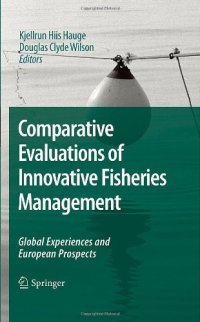
Ebook: Comparative Evaluations of Innovative Fisheries Management: Global Experiences and European Prospects
Author: Douglas Clyde Wilson Kjellrun Hiis Hauge (auth.) Kjellrun Hiis Hauge Douglas Clyde Wilson (eds.)
- Genre: Mathematics // Applied Mathematicsematics
- Tags: Sustainable Development, Fish & Wildlife Biology & Management, Environmental Economics, Social Sciences general, Environmental Management, European Law/Public International Law
- Year: 2009
- Publisher: Springer Netherlands
- Edition: 1
- Language: English
- pdf
The Comparative Evaluations of Innovative Solutions in European Fisheries Management (CEVIS) Project (2006 - 2009) was an exploration of how science can aid policy decisions. CEVIS teamed up biologists, economists, and other social scientists to evaluate four fisheries management innovations being considered for Europe: participatory approaches; rights-based regimes; effort control; and decision-rule systems. Comparative Evaluations of Innovative Fisheries Management brings the CEVIS project full circle by providing further insights into the role of science in policy.
The volume begins with a look at four places outside the European Union known for innovative management: New Zealand, Nova Scotia, Alaska and Iceland. Then the focus shifts to the success criteria related to specific disciplines including biological and social robustness, economic efficiency and impacts on management costs. Hypotheses are tested using data capable of generating useful results. The main conclusions include a retrospective of how key concepts defined and represented the various perspectives, skills and backgrounds that made up the multidisciplinary CEVIS project.
Comparative Evaluations of Innovative Fisheries Management begins with a look at four places outside the European Union known for innovative management: New Zealand, Nova Scotia, Alaska and Iceland. Then the focus shifts to the success criteria related to specific disciplines including biological and social robustness, economic efficiency and impacts on management costs. Hypotheses are tested using data capable of generating useful results. The main conclusions include a retrospective of how key concepts defined and represented the various perspectives, skills and backgrounds that made up the multidisciplinary CEVIS project.